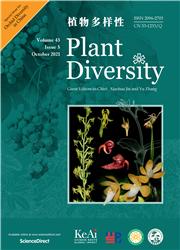Herbivore and native plant diversity synergistically resist alien plant invasion regardless of nutrient conditions
IF 4.6
1区 生物学
Q1 PLANT SCIENCES
引用次数: 0
Abstract
Alien plant invasion success can be inhibited by two key biotic factors: native herbivores and plant diversity. However, few studies have experimentally tested whether these factors interact to synergistically resist invasion success, especially factoring in changing global environments (e.g. nutrient enrichment). Here we tested how the synergy between native herbivores and plant diversity affects alien plant invasion success in various nutrient conditions. For this purpose, we exposed alien plant species in pot-mesocosms to different levels of native plant diversity (4 vs. 8 species), native generalist herbivores, and high and low soil nutrient levels. We found that generalist herbivores preferred alien plants to native plants, inhibiting invasion success in a native community. This inhibition was amplified by highly diverse native communities. Further, the amplified effect between herbivory and native plant diversity was independent of nutrient conditions. Our results suggest that a higher diversity of native communities can strengthen the resistance of native generalist herbivores to alien plant invasions by enhancing herbivory tolerance. The synergistic effect remains in force in nutrient-enriched habitats that are always invaded by alien plant species. Our results shed light on the effective control of plant invasions using multi-trophic means, even in the face of future global changes.无论营养条件如何,食草动物和本地植物多样性都能协同抵抗外来植物的入侵
外来植物的成功入侵可能受到两个关键生物因素的抑制:本地食草动物和植物多样性。然而,很少有研究通过实验测试这些因素是否相互作用以协同抵抗入侵成功,特别是考虑到不断变化的全球环境(如养分富集)。在这里,我们测试了本地食草动物和植物多样性之间的协同作用如何影响不同营养条件下外来植物的入侵成功。为此,我们将盆栽中生态系统中的外来植物物种暴露于不同水平的本地植物多样性(4种vs. 8种)、本地多面体食草动物以及高和低土壤养分水平。研究发现,多面手食草动物对外来植物的偏好大于对本地植物的偏好,从而抑制了对本地群落的入侵成功。这种抑制作用被高度多样化的土著社区放大了。此外,草食植物多样性与本地植物多样性之间的放大效应与养分条件无关。研究结果表明,较高的本地群落多样性可以通过提高植物的耐受性来增强本地通才食草动物对外来植物入侵的抵抗力。在经常被外来植物入侵的营养丰富的生境中,协同效应仍然有效。我们的研究结果为利用多营养手段有效控制植物入侵提供了启示,即使面对未来的全球变化。
本文章由计算机程序翻译,如有差异,请以英文原文为准。
求助全文
约1分钟内获得全文
求助全文
来源期刊

Plant Diversity
Agricultural and Biological Sciences-Ecology, Evolution, Behavior and Systematics
CiteScore
8.30
自引率
6.20%
发文量
1863
审稿时长
35 days
期刊介绍:
Plant Diversity (formerly Plant Diversity and Resources) is an international plant science journal that publishes substantial original research and review papers that
advance our understanding of the past and current distribution of plants,
contribute to the development of more phylogenetically accurate taxonomic classifications,
present new findings on or insights into evolutionary processes and mechanisms that are of interest to the community of plant systematic and evolutionary biologists.
While the focus of the journal is on biodiversity, ecology and evolution of East Asian flora, it is not limited to these topics. Applied evolutionary issues, such as climate change and conservation biology, are welcome, especially if they address conceptual problems. Theoretical papers are equally welcome. Preference is given to concise, clearly written papers focusing on precisely framed questions or hypotheses. Papers that are purely descriptive have a low chance of acceptance.
Fields covered by the journal include:
plant systematics and taxonomy-
evolutionary developmental biology-
reproductive biology-
phylo- and biogeography-
evolutionary ecology-
population biology-
conservation biology-
palaeobotany-
molecular evolution-
comparative and evolutionary genomics-
physiology-
biochemistry
 求助内容:
求助内容: 应助结果提醒方式:
应助结果提醒方式:


